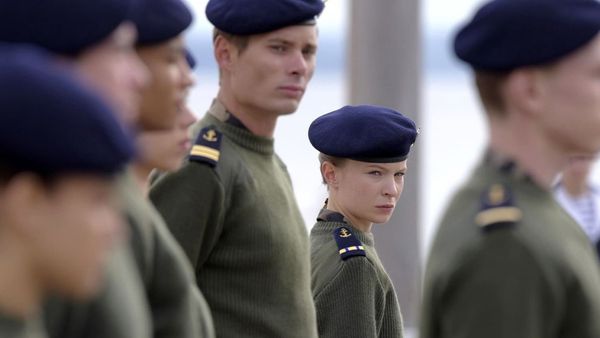Eye For Film >> Movies >> Raising Colors (2018) Film Review
Raising Colors
Reviewed by: Anne-Katrin Titze

How do you show chemistry between two people in cinema? Less is more, would be the answer for this fine romance. With no kisses indeed, but maybe not 'calmer than the seals in the Arctic Ocean,' to quote the Jerome Kern song from Swing Time. It is no coincidence that classic films come to mind in this context, because Raising Colors (Volontaire) treads on unfashionable grounds and emerges victorious.
There are times when daily existence functions on two seemingly separate levels. One consists of the routine actions of working, eating, sleeping, while body, mind and heart are consumed with one person who has cast a spell over everything.

Hélène Fillières' second feature, co-written with Mathias Gavarry, tells of such a time of unexpected infatuation happening to Laure (Diane Rouxel), just when she is about to try and figure out what to do with her life. In her twenties and with a first-rate education, she decides to accept a job offer in the administration of the French Navy. It is an outrageous choice in the eyes of her family who work in the arts and look at all things military with disdain.
Her mother (Josiane Balasko), a famous stage actress, is particularly upset and vocal about it. In a splendid opening sequence - we hear it before we see it - the family preps string beans in the kitchen while the mother wails how the double major in English and Russian from the Sorbonne could only go to waste there.
The young woman craves structure, discipline, something to hold on to that isn't fleeting and make-believe, so much is clear. When she arrives at the Naval Academy, she is first greeted by the interim commander, played by Fillières herself, who gets Laure set for her meeting with the man she will work for. What we hear - that he is the one who decides on pants or skirt for her to wear on official outings, for instance - does prepare neither us nor Laure for what we will see.
Commander Rivière is played by Lambert Wilson, in a subtle and wonderfully deep performance, one of the best of his illustrious career. No one injects humour into a humourless man quite the way he does. The Commander, lovingly called "the monk" by the chief training officer Albertini (Alex Descas, a Claire Denis favourite) is a cipher. He walks briskly, loses no time, and when he talks about the spirit of sacrifice, he means it.
He tells the men and women in uniform who stand on the lawn before him: "You dislike me. I don't like you either." Are things what they seem? Laure who works opposite him in an office separated by a big glass window, is late to congregate one morning. Another colleague is punished for it with 40 push-ups - an effective deterrent if there ever was one. Laure tells him that she deserves the punishment, of course.
The tension between the two is palpable and you realize how rare it is to see an exploration of this kind of spark in movies today. The most interesting action takes place in her head and in his - which really means, in ours. The actors' faces and bodies form the canvas while each spectator creates their own narrative and wish fulfilment. A car ride at sunset, with Nick Cave crooning Into My Arms should do the trick.
Raising Colors is a film concerned with walls. The physical brick wall of the obstacle course that needs to be conquered and the walls that we all build around our hearts to protect what is most fragile. There is an opportunity at the Naval Academy - but so far the special ops weren't open to women. Laure is tempted, not least to prove herself to one person in particular.
"Never show your cracks" is the Commander's motto. Cold and pain are in your head, she hears during the training, and that's where it shares the space with all the other complicated emotions that make us human. During a presentation Laure gives about D-Day, Commander Rivière leaves the auditorium. Who is this man? After 25 years of service, his Green Beret colleagues seem to know very little. Laure's boyfriend from back home can't find a place in her life any more and he is definitely not up to discussing the Battle of Normandy during an intimate embrace.
Shot at the École Navale, a great spirit of place aides to make this a military film unlike any other. Yes, there is sexism, and it shows itself in real ways, and thankfully not in the form of exaggerated clichés. The film ends on a marvellous, unpredictable note, giving credit to life's mysteries and we are squarely confronted with our own speculations and assumptions.
Reviewed on: 22 Mar 2019














